- Home
- Albert Camus
The Myth of Sisyphus and Other Essays
The Myth of Sisyphus and Other Essays Read online
The Myth Of Sisyphus And Other Essays
Albert Camus
Translated from the French by Justin O’Brien
1955
Contents
Preface
The Myth Of Sisyphus
An Absurd Reasoning
Absurdity and Suicide
Absurd Walk
Philosophical Suicide
Absurd Freedom
The Absurd Man
Don Juanism
Drama
Conquest
Absurd Creation
Philosophy and Fiction
Kirilov
Ephemeral Creation
The Myth Of Sisyphus
Appendix: Hope and the Absurd in the Work of Franz Kafka
Summer In Algiers
The Minotaur or The Stop In Oran
The Street
The Desert in Oran
Sports
Monuments
Ariadne’s Stone
Helen’s Exile
Return To Tipasa
The Artist And His Time
Preface
For me “The Myth of Sisyphus” marks the beginning of an idea which I was to pursue in The Rebel. It attempts to resolve the problem of suicide, as The Rebel attempts to resolve that of murder, in both cases without the aid of eternal values which, temporarily perhaps, are absent or distorted in contemporary Europe. The fundamental subject of “The Myth of Sisyphus” is this: it is legitimate and necessary to wonder whether life has a meaning; therefore it is legitimate to meet the problem of suicide face to face. The answer, underlying and appearing through the paradoxes which cover it, is this: even if one does not believe in God, suicide is not legitimate. Written fifteen years ago, in 1940, amid the French and European disaster, this book declares that even within the limits of nihilism it is possible to find the means to proceed beyond nihilism. In all the books I have written since, I have attempted to pursue this direction. Although “The Myth of Sisyphus” poses mortal problems, it sums itself up for me as a lucid invitation to live and to create, in the very midst of the desert.
It has hence been thought possible to append to this philosophical argument a series of essays, of a kind I have never ceased writing, which are somewhat marginal to my other books. In a more lyrical form, they all illustrate that essential fluctuation from assent to refusal which, in my view, defines the artist and his difficult calling. The unity of this book, that I should like to be apparent to American readers as it is to me, resides in the reflection, alternately cold and impassioned, in which an artist may indulge as to his reasons for living and for creating. After fifteen years I have progressed beyond several of the positions which are set down here; but I have remained faithful, it seems to me, to the exigency which prompted them. That is why this hook is in a certain sense the most personal of those I have published in America. More than the others, therefore, it has need of the indulgence and understanding of its readers.
—Albert Camus, Paris, March 1955
for PASCAL PIA
O my soul, do not aspire to immortal life, but exhaust the limits of the possible.
—Pindar, Pythian iii
The pages that follow deal with an absurd sensitivity that can be found widespread in the age—and not with an absurd philosophy which our time, properly speaking, has not known. It is therefore simply fair to point out, at the outset, what these pages owe to certain contemporary thinkers. It is so far from my intention to hide this that they Will be found cited and commented upon throughout this work.
But it is useful to note at the same time that the absurd, hitherto taken as a conclusion, is considered in this essay as a starting-point. In this sense it may be said that there is something provisional in my commentary: one cannot prejudge the position it entails. There will be found here merely the description, in the pure state, of an intellectual malady. No metaphysic, no belief is involved in it for the moment. These are the limits and the only bias of this book. Certain personal experiences urge me to make this clear.
The Myth Of Sisyphus
An Absurd Reasoning
Absurdity and Suicide
There is but one truly serious philosophical problem, and that is suicide. Judging whether life is or is not worth living amounts to answering the fundamental question of philosophy. All the rest—whether or not the world has three dimensions, whether the mind has nine or twelve categories—comes afterwards. These are games; one must first answer. And if it is true, as Nietzsche claims, that a philosopher, to deserve our respect, must preach by example, you can appreciate the importance of that reply, for it will precede the definitive act. These are facts the heart can feel; yet they call for careful study before they become clear to the intellect.
If I ask myself how to judge that this question is more urgent than that, I reply that one judges by the actions it entails. I have never seen anyone die for the ontologi-cal argument. Galileo, who held a scientific truth of great importance, abjured it with the greatest ease as soon as it endangered his life. In a certain sense, he did right.[1] That truth was not worth the stake. Whether the earth or the sun revolves around the other is a matter of profound indifference. To tell the truth, it is a futile question. On the other hand, I see many people die because they judge that life is not worth living. I see others paradoxically getting killed for the ideas or illusions that give them a reason for living (what is called a reason for living is also an excellent reason for dying). I therefore conclude that the meaning of life is the most urgent of questions. How to answer it? On all essential problems (I mean thereby those that run the risk of leading to death or those that intensify the passion of living) there are probably but two methods of thought: the method of La Palisse and the method of Don Quixote. Solely the balance between evidence and lyricism can allow us to achieve simultaneously emotion and lucidity. In a subject at once so humble and so heavy with emotion, the learned and classical dialectic must yield, one can see, to a more modest attitude of mind deriving at one and the same time from common sense and understanding.
Suicide has never been dealt with except as a social phenomenon. On the contrary, we are concerned here, at the outset, with the relationship between individual thought and suicide. An act like this is prepared within the silence of the heart, as is a great work of art. The man himself is ignorant of it. One evening he pulls the trigger or jumps. Of an apartment-building manager who had killed himself I was told that he had lost his daughter five years before, that be bad changed greatly since, and that that experience had “undermined” him. A more exact word cannot be imagined. Beginning to think is beginning to be undermined. Society has but little connection with such beginnings. The worm is in man’s heart. That is where it must be sought. One must follow and understand this fatal game that leads from lucidity in the face of existence to flight from light.
There are many causes for a suicide, and generally the most obvious ones were not the most powerful. Rarely is suicide committed (yet the hypothesis is not excluded) through reflection. What sets off the crisis is almost always unverifiable. Newspapers often speak of “personal sorrows” or of “incurable illness.” These explanations are plausible. But one would have to know whether a friend of the desperate man had not that very day addressed him indifferently. He is the guilty one. For that is enough to precipitate all the rancors and all the boredom still in suspension.[2]
But if it is hard to fix the precise instant, the subtle step when the mind opted for death, it is easier to deduce from the act itself the consequences it implies. In a sense, and as in melodrama, killing yourself amounts to confessing. It is confessing that life is too much for you or that you do not understand it. Le
t’s not go too far in such analogies, however, but rather return to everyday words. It is merely confessing that that “is not worth the trouble.” Living, naturally, is never easy. You continue making the gestures commanded by existence for many reasons, the first of which is habit. Dying voluntarily implies that you have recognized, even instinc—
tively, the ridiculous character of that habit, the absence of any profound reason for living, the insane character of that daily agitation, and the uselessness of suffering.
What, then, is that incalculable feeling that deprives the mind of the sleep necessary to life? A world that can be explained even with bad reasons is a familiar world. But, on the other hand, in a universe suddenly divested of illusions and lights, man feels an alien, a stranger. His exile is without remedy since he is deprived of the memory of a lost home or the hope of a promised land. This divorce between man and this life, the actor and his setting, is properly the feeling of absurdity. All healthy men having thought of their own suicide, it can be seen, without further explanation, that there is a direct connection between this feeling and the longing for death.
The subject of this essay is precisely this relationship between the absurd and suicide, the exact degree to which suicide is a solution to the absurd. The principle can be established that for a man who does not cheat, what he believes to be true must determine his action. Belief in the absurdity of existence must then dictate his conduct. It is legitimate to wonder, clearly and without false pathos, whether a conclusion of this importance requires forsaking as rapidly as possible an incomprehensible condition. I am speaking, of course, of men inclined to be in harmony with themselves.
Stated clearly, this problem may seem both simple and insoluble. But it is wrongly assumed that simple questions involve answers that are no less simple and that evidence implies evidence. A priori and reversing the terms of the problem, just as one does or does not kill oneself, it seems that there are but two philosophical solutions, either yes or no. This would be too easy. But allowance must be made for those who, without concluding, continue questioning. Here I am only slightly indulging in irony: this is the majority. I notice also that those who answer “no” act as if they thought “yes.” As a matter of fact, if I accept the Nietzschean criterion, they think “yes” in one way or another. On the other hand, it often happens that those who commit suicide were assured of the meaning of life. These contradictions are constant. It may even be said that they have never been so keen as on this point where, on the contrary, logic seems so desirable. It is a commonplace to compare philosophical theories and the behavior of those who profess them. But it must be said that of the thinkers who refused a meaning to life none except Kirilov who belongs to literature, Peregrinos who is born of legend,[3] and Jules Lequier who belongs to hypothesis, admitted his logic to the point of refusing that life. Schopenhauer is often cited, as a fit subject for laughter, because he praised suicide while seated at a well-set table. This is no subject for joking. That way of not taking the tragic seriously is not so grievous, but it helps to judge a man.
In the face of such contradictions and obscurities must we conclude that there is no relationship between the opinion one has about life and the act one commits to leave it? Let us not exaggerate in this direction. In a man’s attachment to life there is something stronger than all the ills in the world. The body’s judgment is as good as the mind’s and the body shrinks from annihilation. We get into the habit of living before acquiring the habit of thinking. In that race which daily hastens us toward death, the body maintains its irreparable lead. In short, the essence of that contradiction lies in what I shall call the act of eluding because it is both less and more than diversion in the Pascalian sense. Eluding is the invariable game. The typical act of eluding, the fatal evasion that constitutes the third theme of this essay, is hope. Hope of another life one must “deserve” or trickery of those who live not for life itself but for some great idea that will transcend it, refine it, give it a meaning, and betray it.
Thus everything contributes to spreading confusion.
Hitherto, and it has not been wasted effort, people have played on words and pretended to believe that refusing to grant a meaning to life necessarily leads to declaring that it is not worth living. In truth, there is no necessary common measure between these two judgments. One merely has to refuse to he misled by the confusions, divorces, and inconsistencies previously pointed out. One must brush everything aside and go straight to the real problem. One kills oneself because life is not worth living, that is certainly a truth yet an unfruitful one because it is a truism. But does that insult to existence, that flat denial in which it is plunged come from the fact that it has no meaning? Does its absurdity require one to escape it through hope or suicide—this is what must be clarified, hunted down, and elucidated while brushing aside all the rest. Does the Absurd dictate death? This problem must be given priority over others, outside all methods of thought and all exercises of the disinterested mind. Shades of meaning, contradictions, the psychology that an “objective” mind can always introduce into all problems have no place in this pursuit and this passion. It calls simply for an unjust—in other words, logical—thought. That is not easy. It is always easy to be logical. It is almost impossible to be logical to the bitter end. Men who die by their own hand consequently follow to its conclusion their emotional inclination. Reflection on suicide gives me an opportunity to raise the only problem to interest me: is there a logic to the point of death? I cannot know unless I pursue, without reckless passion, in the sole light of evidence, the reasoning of which I am here suggesting the source. This is what I call an absurd reasoning. Many have begun it. I do not yet know whether or not they kept to it.
When Karl Jaspers, revealing the impossibility of constituting the world as a unity, exclaims: “This limitation leads me to myself, where I can no longer withdraw behind an objective point of view that I am merely representing, where neither I myself nor the existence of others can any longer become an object for me,” he is evoking after many others those waterless deserts where thought reaches its confines. After many others, yes indeed, but how eager they were to get out of them! At that last crossroad where thought hesitates, many men have arrived and even some of the humblest. They then abdicated what was most precious to them, their life. Others, princes of the mind, abdicated likewise, but they initiated the suicide of their thought in its purest revolt. The real effort is to stay there, rather, in so far as that is possible, and to examine closely the odd vegetation of those distant regions. Tenacity and acumen are privileged spectators of this inhuman show in which absurdity, hope, and death carry on their dialogue. The mind can then analyze the figures of that elementary yet subtle dance before illustrating them and reliving them itself.
Absurd Walls
Like great works, deep feelings always mean more than they are conscious of saying. The regularity of an impulse or a repulsion in a soul is encountered again in habits of doing or thinking, is reproduced in consequences of which the soul itself knows nothing. Great feelings take with them their own universe, splendid or abject. They light up with their passion an exclusive world in which they recognize their climate. There is a universe of jealousy, of ambition, of selfishness, or of generosity. A universe in other words, a metaphysic and an attitude of mind. What is true of already specialized feelings will be even more so of emotions basically as indeterminate, simultaneously as vague and as “definite,” as remote and as “present” as those furnished us by beauty or aroused by absurdity.
At any streetcorner the feeling of absurdity can strike any man in the face. As it is, in its distressing nudity, in its light without effulgence, it is elusive. But that very difficulty deserves reflection. It is probably true that a man remains forever unknown to us and that there is in him something irreducible that escapes us. But practically I know men and recognize them by their behavior, by the totality of their deeds, by the consequences caused in life by their presence. Likewise, a
ll those irrational feelings which offer no purchase to analysis. I can define them practically, appreciate them practically, by gathering together the sum of their consequences in the domain of the intelligence, by seizing and noting all their aspects, by outlining their universe. It is certain that apparently, though I have seen the same actor a hundred times, I shall not for that reason know him any better personally. Yet if I add up the heroes he has personified and if I say that I know him a little better at the hundredth character counted off, this will be felt to contain an element of truth. For this apparent paradox is also an apologue. There is a moral to it. It teaches that a man defines himself by his make-believe as well as by his sincere impulses. There is thus a lower key of feelings, inaccessible in the heart but partially disclosed by the acts they imply and the attitudes of mind they assume. It is clear that in this way I am defining a method. But it is also evident that that method is one of analysis and not of knowledge. For methods imply metaphysics; unconsciously they disclose conclusions that they often claim not to know yet. Similarly, the last pages of a book are already contained in the first pages. Such a link is inevitable. The method defined here acknowledges the feeling that all true knowledge is impossible. Solely appearances can be enumerated and the climate make itself felt.
Perhaps we shall be able to overtake that elusive feeling of absurdity in the different but closely related worlds of intelligence, of the art of living, or of art itself. The climate of absurdity is in the beginning. The end is the absurd universe and that attitude of mind which lights the world with its true colors to bring out the privileged and implacable visage which that attitude has discerned in it.
* * *
All great deeds and all great thoughts have a ridiculous beginning. Great works are often born on a street-corner or in a restaurant’s revolving door. So it is with absurdity. The absurd world more than others derives its nobility from that abject birth. In certain situations, replying “nothing” when asked what one is thinking about may be pretense in a man. Those who are loved are well aware of this. But if that reply is sincere, if it symbolizes that odd state of soul in which the void be-comes eloquent, in which the chain of daily gestures is broken, in which the heart vainly seeks the link that will connect it again, then it is as it were the first sign of absurdity.

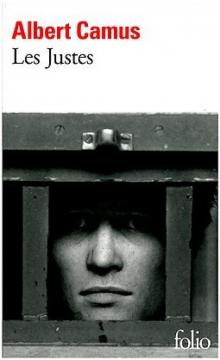 Les Justes
Les Justes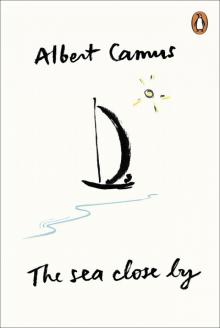 The Sea Close By
The Sea Close By The Stranger
The Stranger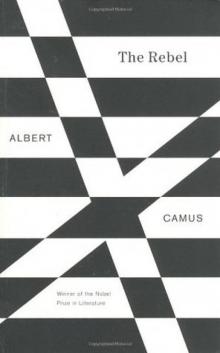 The Rebel: An Essay on Man in Revolt
The Rebel: An Essay on Man in Revolt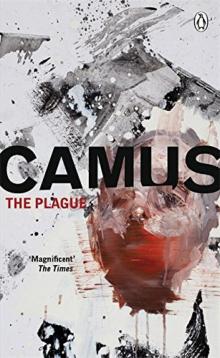 The plague
The plague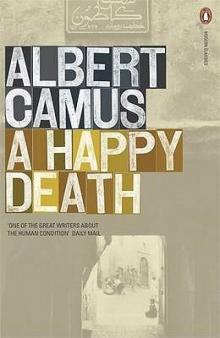 A Happy Death
A Happy Death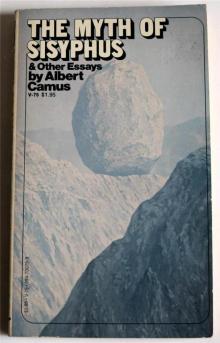 The Myth of Sisyphus and Other Essays
The Myth of Sisyphus and Other Essays The Fall
The Fall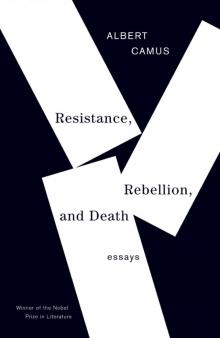 Resistance, Rebellion, and Death
Resistance, Rebellion, and Death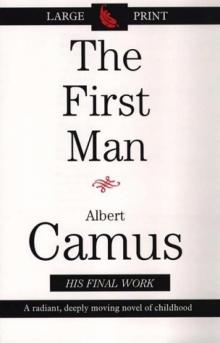 The First Man
The First Man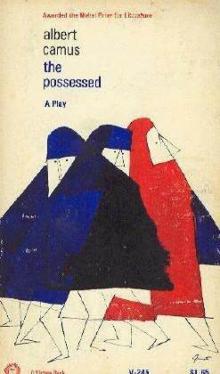 The Possessed
The Possessed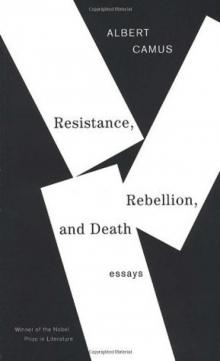 Resistance, Rebellion and Death: Essays
Resistance, Rebellion and Death: Essays